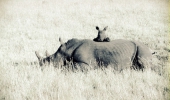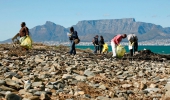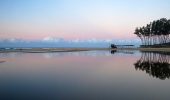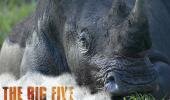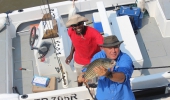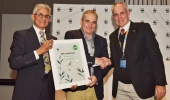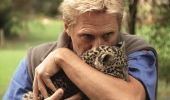Words: iSimangaliso Wetland Park Authority
"iSimangaliso must be the only place on the globe where the oldest land mammal (the rhinoceros) and the world’s biggest terrestrial mammal (the elephant) share an ecosystem with the world’s oldest fish (the coelacanth) and the world’s biggest marine mammal (the whale)" – President Nelson Rolihlahla Mandela, 2001.
President Nelson Mandela’s words have inspired the iSimangaliso Authority and a consortium of partners to implement a large scale community conservation awareness and rhino protection programme with 75 schools and over 11 250 learners from around the iSimangaliso Wetland Park.
The broad-based programme specifically targets youth in the protection of rhinos and other iconic and endangered species in iSimangaliso and South Africa. It also enables youngsters to take pride in and ownership of South Africa’s first World Heritage Site.
Given the depth and breadth of the initiative, a multi-disciplinary partnership – including the Department of Environmental Affairs, Ezemvelo KZN Wildlife, Wildlands, Project Rhino KZN, Wildlife ACT, African Conservation Trust, Peace Parks Foundation and the Zululand Anti-Poaching Wing – was required. Each partner has brought its own strengths and experience together, as well as a deep commitment, to stop the scourge of rhino poaching.
The Minister of Environmental Affairs, Ms Edna Molewa (MP) says: "We have long acknowledged that the fight against rhino poaching cannot be won alone. We are especially proud to partner with iSimangaliso as part of a consortium of environmental organisations rooting an innovative anti-poaching initiative deep in the communities of northern KZN – and, in particular, turning a new generation of learners into conservation ambassadors. It’s only through this combined, community-based effort that we will be able to rid South Africa of this scourge.”
The ‘Rhino Walk’ will take place from 7 September – 2 October 2015. Learners, principals and educators will walk with conservation agencies, NGOs, traditional leadership, land claimant groups and local, provincial and national government, from school to school across the length of the iSimangaliso Wetland Park - which is over 220km from Maphelane to Kosi Bay. The Walk will provide an opportunity for all these groups to show solidarity for the conservation of rhinos and other iconic species within iSimangaliso. It is a challenge to young people here and afar to take up the cause – hopefully spreading to all corners of the Earth through the power of social media.
Much like an Olympian event, this bold and groundbreaking programme will represent the single biggest such organised youth drive in the country to date, carrying the torch of knowledge from school to school in some of the most remote parts of South Africa.
Says Andrew Zaloumis, CEO of iSimangaliso Wetland Park: “We have an established developmental partnership with these schools. The aim of this environmental awareness and rhino protection intervention is to nurture a generation of wildlife ambassadors and leaders who are committed to all threatened species, big and small – the eco-system processes, biodiversity, and incredible beauty of the region where we live. We will only achieve long term success in stopping rhino poaching if we have the support of conservation-minded local communities and most importantly, the next generation."
Francois du Toit, CEO of the African Conservation Trust endorses this comment: “We cannot sustain or conserve South Africa’s resources nor alleviate the current environmental crises we face without the participation of the very people affected. A community based awareness programme like ‘iSimangaliso My Rhino, Our Future’ engages local communities by giving them a platform to discuss conservation issues.”
And the ambitious scale of the project is no accident. “Critical mass is key to beating this epidemic,” says Sheelagh Antrobus, Coordinator of Project Rhino KZN, an 18-member conservation association that represents provincial, private and NGO stakeholders in the province. “We are aware that the poaching of rhino is symptomatic of the overall, bigger environmental crises facing South African parks and its neighbours and recognise that the work in conserving and protecting rhinos in iSimangaliso from the threat of poaching is symbolic of the broader threat faced by all wildlife. Broad-based community conservation awareness plays a vital role in eliminating South Africa’s current poaching crisis”.
The universal languages of art, drama and song - which transcend language barriers - have already been employed during the foundation phase of the “iSimangaliso My Rhino, Our Future” programme. Completed on the 28 August, this involved ‘Rhino Art’ at each of the 75 schools, with learners using their own artwork to send their messages of support for conservation and express their feelings about rhino poaching. These works have been curated into a powerful visual message that will cross the seas to other nations.
Playing an integral role in the ‘Rhino Art’ project was the Kingsley Holgate Foundation. “We cannot win the war against rhino poaching if we don’t involve the communities living alongside the reserves, no more so than the 220km long iSimangaliso,” comments Kingsley Holgate. “We need to be conscious of their concerns and include communities in conservation activities”.
A highlight of the Walk includes a celebratory event on World Rhino Day, the 22nd September, which will turn the spotlight on the youths’ commitment to conservation. Learners, educators, community leaders, government and conservation organisations will come together and symbolically join hands as a united front in the fight against poaching and our combined efforts to tackle the greatest threat to this iconic population – human greed.
Greed, however, is not the only negative force we have to fight. “Poverty,” according to Dr Andrew Venter, CEO of Wildlands, “remains a major problem in northern KZN and it is impossible to over-emphasise the importance of connecting wildlife conservation and the protection of threatened species with socio-economic development. Creating a new generation of environment advocates doesn’t happen in isolation and so it is important that we partner iSimangaliso, at the World Rhino Day celebration, as we show the thread that connects everything.”
Werner Myburgh, CEO of Peace Parks Foundation, echoed the critical influence that the voice of the younger generation can have in affecting change: “As part of our Rhino Protection Programme, Peace Parks Foundation recently engaged youth from Vietnam in a demand reduction awareness programme. These youngsters returned to their home country with a fervour and determination to transform the behaviour of their communities towards conservation – reminding us again to never underestimate our youth. We are proud to be part of the iSimangaliso programme, which will surely ignite the same passion and resolve in the youth of South Africa.”
iSimangaliso’s conservation partner, Ezemvelo KZN Wildlife’s CEO Dr David Mabunda says: “We are excited to be part of this project as it will complement Ezemvelo KZN Wildlife's enforcement efforts with iSimangaliso and our nearby parks like Hluhluwe-iMfolozi on the ground by building a critical mass of people in the area who believe in conservation.”
"Our core function at Wildlife ACT is to save threatened and endangered wildlife species from extinction and ‘iSimangaliso My Rhino, Our Future’ is using conservation awareness to grow support for the protection of species threatened by poaching and other illegal activities. This is why we believe in supporting initiatives such as this", says Wildlife ACT Director, Chris Kelly.
“But to win the war against poaching,” says Lawrence Munro from the Zululand Anti-Poaching Wing, "we need innovative approaches. ZAP-Wing is South Africa’s first public-private aerial anti-poaching initiative and provides support to 26 provincial and private reserves. Combine aerial surveillance with local support from the communities living next to the Park, and we could be unstoppable in catching poachers. A coordinated effort like iSimangaliso’s conservation awareness programme is required to garner local support and create future rhino ambassadors”.
For more information or to join the Rhino Walk, please contact the iSimangaliso Media Officer, Siyabonga Mhlongo at or on 084 382 0884. To learn more about the iSimangaliso Wetland Park, follow us on Twitter, Instagram, Facebook and Youtube, or visit our website at www.isimangaliso.com.
